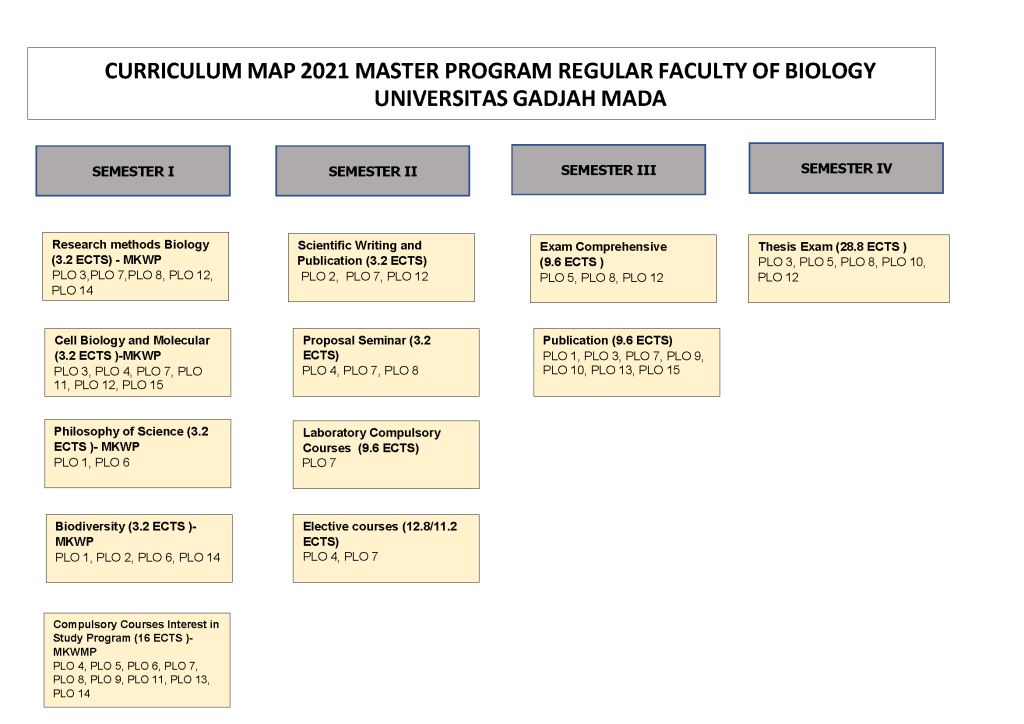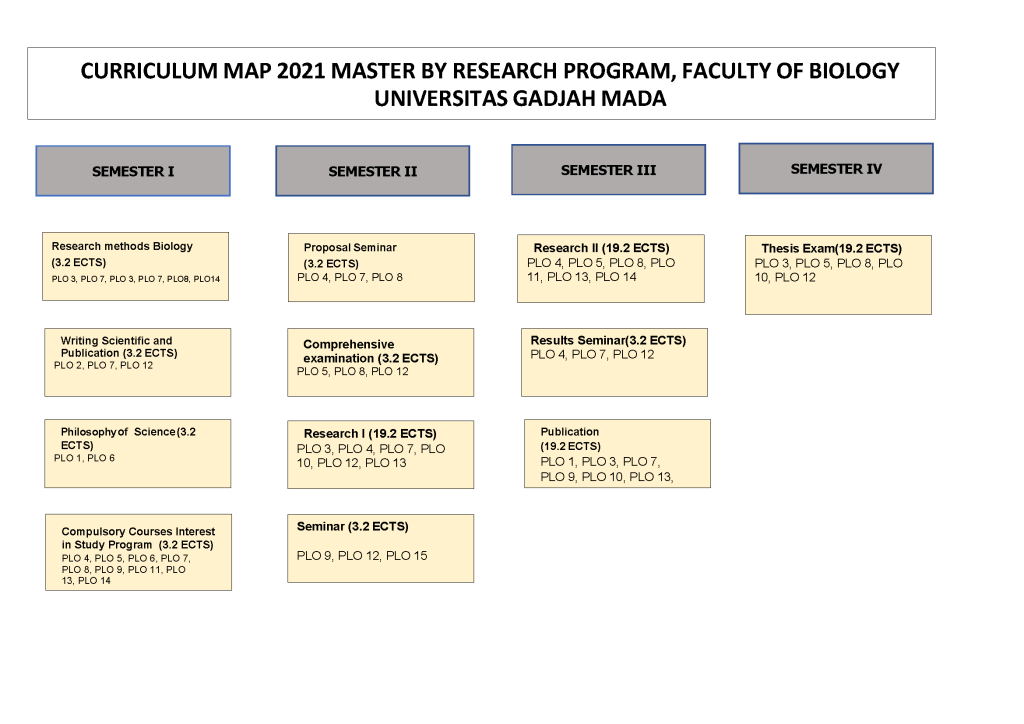Courses in Study Program of Master in Biology
SP-MB organizes 2 curricula, namely regular and by research programs (Tables 1 and 2). The curriculum contains Compulsory Courses for Study Program, Compulsory Courses for Study Interest, Laboratory Compulsory Courses, and Elective Courses. The curriculum has led to a specialization in the field of Biology, which is consisted of 7 (seven) study interests, i.e., Industrial Biology and Biological Engineering, Medical and Forensic Biology, Functional and Developmental Biology, Biodiversity and Biosystematics, Systems Biology and Synthetics, Marine Biology, and Environmental and Conservation Biology.
For regular programs, students can take 14-18 credits in semesters 1 and 2 so that in semester 3 they can have a minimum of 32 credits and meet the requirement for partaking in a comprehensive examination. The thesis examination is six credits, scheduled in semester 4. Students must take at least 42 credits to complete the master’s program. For by research program, students will take 40 credits to complete the master program with emphasis on research projects. In the first semester, the students must take the Study Program Compulsory courses (Research Methodology in Biology, Science Philosophy, and Scientific Writing and Publication, total 6 credits) and Compulsory Courses for Study Interest (2 credits). For the second and third semester, it consists of the courses of Proposal Seminar (2 credits),
Comprehensive Exam (2 credits), Research I (6 credits), Seminar (2 credits), Research II (6 credits), Seminar Result (2 credits), and Publication (6 credits). In the fourth semester, the students take a Thesis Exam (6 credits). For graduation, the students should have at least 1 (one) international publication.
As of now, SP-MB has started employing OBE and aligned the curriculum to the PLO that
has been set up according to IQF mandates.


| # | Course Code | Course Name | Credits |
| 1 | BIMB202101 | Research Methodology in Biology | 2-0 |
| 2 | BIMB202102 | Cell and Molecular Biology | 2-0 |
| 3 | BIMB202103 | Science Philosophy | 2-0 |
| 4 | BIMB202104 | Biodiversity | 2-0 |
| 5 | BIMB202201 | Scientific Writing and Publication | 2-0 |
| 6 | BIMB202301 | Comprehensive exam | 2-0 |
| 7 | BIMB202302 | Publication | 2-0 |
| 8 | BIMB202401 | Thesis exam | 6-0 |
| # | Course Code | Course Name | Credits |
| 1. Industrial Biology and Biological Engineering | |||
| 1 | BIMB202105 | Bioprospect and Entrepreneurship | 2-0 |
| 2 | BIMB202106 | Biological Engineering | 2-0 |
| 3 | BIMB202107 | Bioprocess and Biorefinery | 2-1 |
| 4 | BIMB202108 | Biodegradation and Bioremediation | 3-0 |
| 2. Medical Biology and Forensic | |||
| 1 | BIMB202109 | Forensic Biology | 2-0 |
| 2 | BIMB202110 | Cellular and Molecular Immunology | 2-1 |
| 3 | BIMB202111 | Analytical Biochemistry | 2-1 |
| 4 | BIMB202112 | Nutrition and Metabolism | 2-0 |
| 3. Functional and Developmental Biology | |||
| 1 | BIMB202113 | Molecular Developmental Biology | 2-0 |
| 2 | BIMB202114 | Structural and Functional Biology | 2-1 |
| 3 | BIMB202115 | Reproduction Biology | 2-0 |
| 4 | BIMB202116 | Microscopy and Microtechnique | 2-1 |
| 4. Biodiversity and Biosystematics | |||
| 1 | BIMB202117 | Biosystematics | 2-0 |
| 2 | BIMB202118 | Biogeography | 2-0 |
| 3 | BIMB202119 | Systematic Research Methods | 2-1 |
| 4 | BIMB202120 | Ethnobiology | 2-1 |
| 5. Systems Biology and Synthetics | |||
| 1 | BIMB202121 | Omics | 2-0 |
| 2 | BIMB202122 | Natural Products | 2-0 |
| 3 | BIMB202123 | Cell and Molecular Genetics | 2-1 |
| 4 | BIMB202124 | Genetic Engineering and Biotechnology | 2-1 |
| 6. Marine Biology | |||
| 1 | BIMB202125 | Marine Biota | 2-0 |
| 2 | BIMB202126 | Management of Marine Biology | 2-1 |
| 3 | BIMB202123 | Natural Products | 2-0 |
| 4 | BIMB202127 | Marine Ecology | 2-1 |
| 7. Environmental Biology and Conservation | |||
| 1 | BIMB202128 | Population Ecology | 2-0 |
| 2 | BIMB202129 | Community Ecology | 2-0 |
| 3 | BIMB202130 / BIMB202127 | Limnology/Marine Ecology | 2-1 |
| 4 | BIMB202131 | Conservation Biology | 2-1 |
| # | Course Code | Course Name | Credits |
| 1 | BIMB202203 | Biochemical Signaling System | 2-0 |
| 2 | BIMB202204 | Vegetation Ecology | 2-1 |
| 3 | BIMB202205 | In Vitro Culture Technique | 1-2 |
| 4 | BIMB202206 | Entomology | 2-1 |
| 5 | BIMB202207 | Physiology of Animal Behavior | 2-0 |
| 6 | BIMB202208 | Physiology of Plant Development | 2-1 |
| 7 | BIMB202209 | Genetics | 2-0 |
| 8 | BIMB202210 | Culture Collections and Microbial Techniques | 2-1 |
| 9 | BIMB202211 | Animal Biosystematics | 2-1 |
| 10 | BIMB202212 | Numerical Taxonomy and Plant Phylogenetics | 2-1 |
| 11 | BIMB202213 | Animal Developmental Abnormal | 2-1 |
| 12 | BIMB202214 | Anatomy of Vascular Plant Development | 2-1 |
